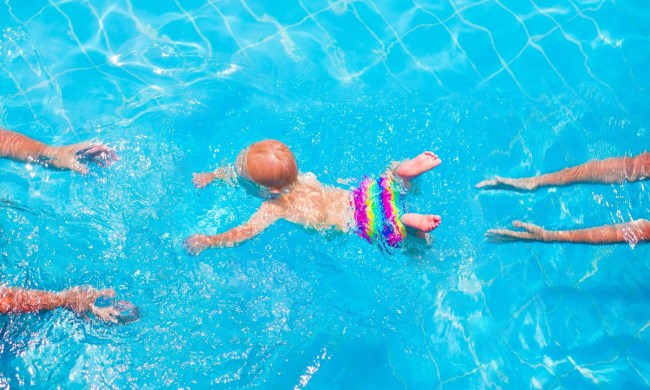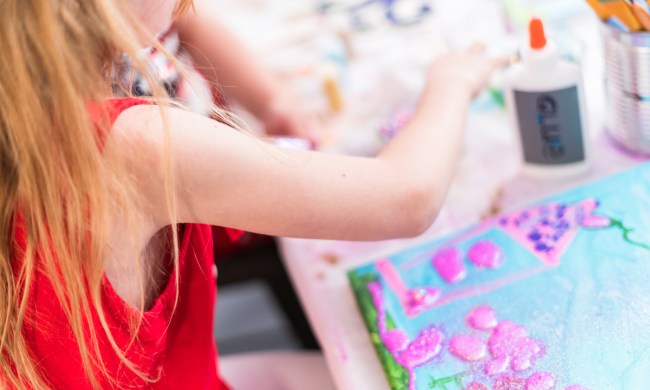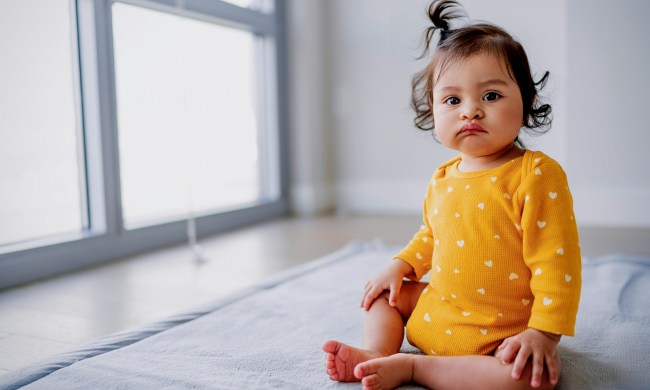Is there anything more adorable than seeing those little baby rolls out, free, and enjoying the fresh air? Not really. But if your tiny tot has eczema, the right sunscreen for their skin type is crucial in keeping those rolls burn-free while keeping itching and irritation to a minimum.
You will want to find a sunscreen that boasts broad-spectrum protection with a sun protection factor (SPF) in the range of 30 to 50. Those with eczema are even more vulnerable in the sun, so it’s doubly important to make sure your little cutie pie is safely slathered. We’ll help you find an eczema sunscreen that’s best for your baby’s skin.
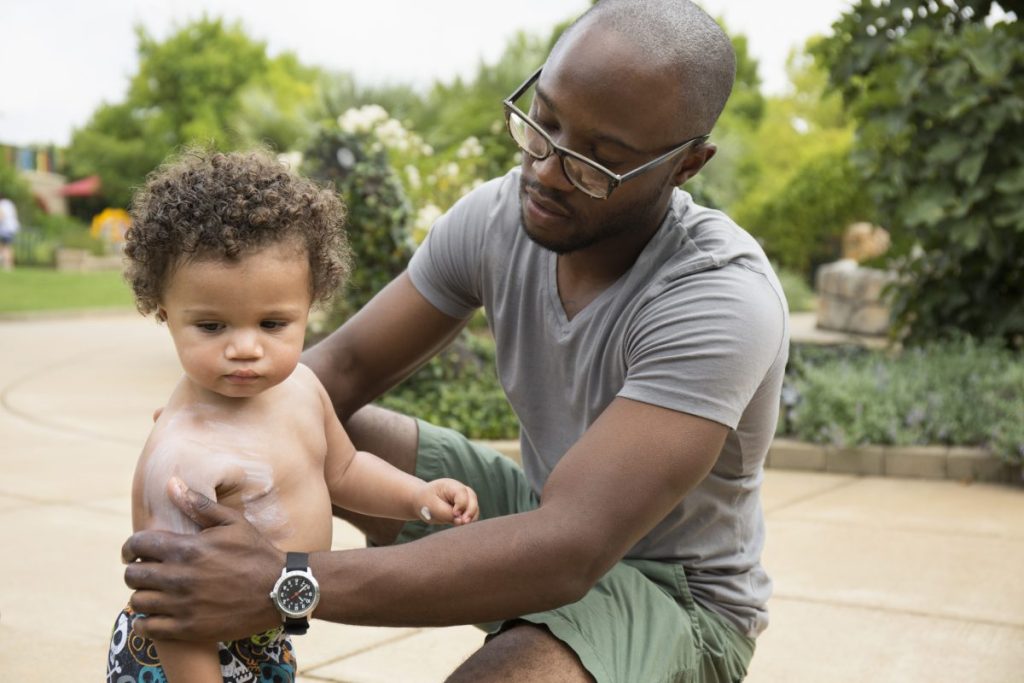
What ingredients to look for in a sunscreen
- Look for ingredients you can read
- Look for sunscreens with fewer ingredients
The simpler, the better. You don’t want all sorts of hard-to-pronounce ingredients in anything you put on your own skin. Less is definitely more when it comes to baby skincare products you put on your precious peanut.
The most important must-have ingredient in your SPF should be zinc oxide or titanium dioxide. If these mineral-based ingredients sound familiar, it’s because they are frequently found in diaper creams. That makes sense, as they act as a barrier to protect the skin.
You might find that zinc options are a little thicker than lotions you’ve used on your own body, and may take a bit longer to rub in all of the way. But the hard-to-disappear formula means it is effective and protective. You should consider swapping out your own sunscreen for a safer option made with zinc. What’s good for baby is good for you.
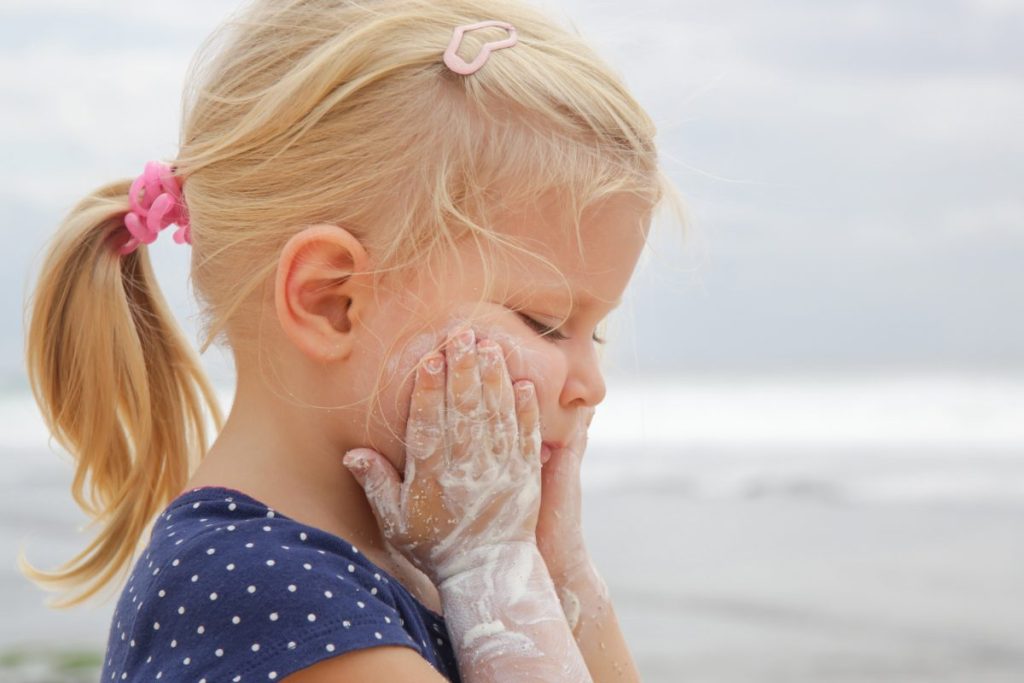
What ingredients to avoid in a sunscreen
If you see the ingredient “oxybenzone” on an SPF bottle (or any bottle in your skin care lineup), put it down, walk away, and move on with your shopping. This compound leads to many unsafe and negative sides effects in humans, and it is damaging to coral reefs.
While you’re checking the label, avoid any SPFs that boast alcohol, fragrances, and dyes. These all irritate normal skin, so skin sporting eczema will be especially dried out and itchy.
In addition, stay away from aerosol-spray options. Baby can’t hold their breath yet, so you run the risk of it going up their nose or in their mouth. Plus, these options are loaded with those bad chemicals you don’t want in any of your skin care products.
If you know that your baby has sensitive skin and is prone to eczema flare-ups, you’ll want to do a patch test of any sunscreen you use before spreading it all over their vulnerable arms, legs, and face. If possible, plan ahead and apply a small amount anywhere but baby’s face, then wait a day or two to make sure that sensitive skin remains calm.
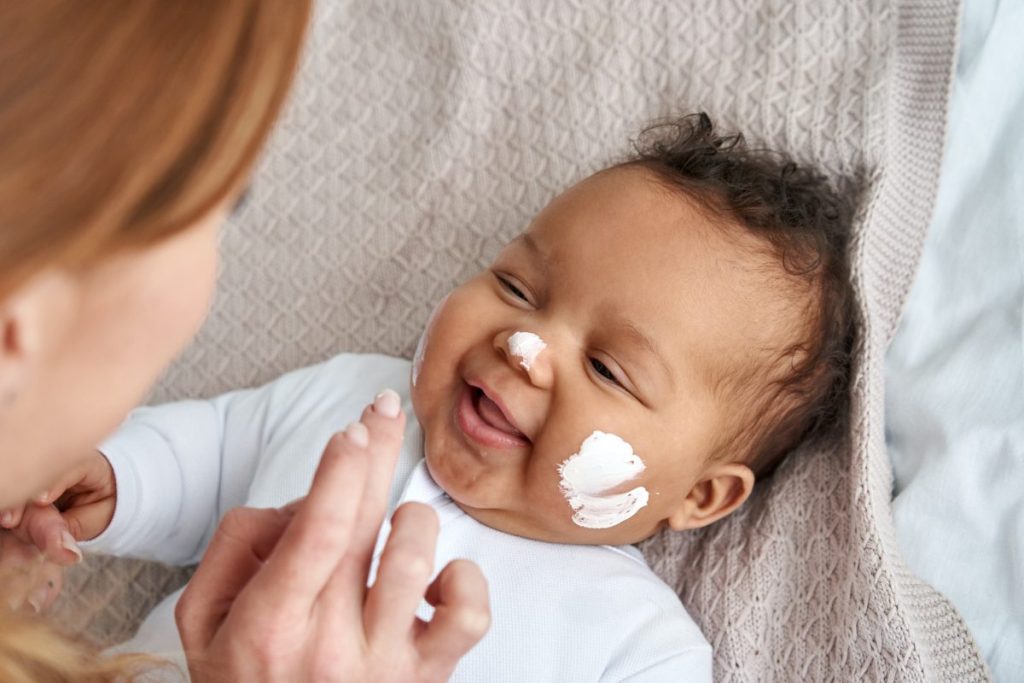
Sunscreen for babies with eczema
The American Academy of Pediatrics recommends that babies 6 months of age and younger always stay out of the sun. However, if you must be in direct sun for even a short amount of time with your little one, apply a small amount of sunscreen to exposed key areas of your baby’s body and face. Infants older than 6 months and toddlers who will be out and about in the sun should have sunscreen applied (and reapplied) liberally to their faces and bodies.
Your baby’s delicate skin deserves the best. You’ll want a sunscreen that is gentle with ample protection. Here are a few highly rated options to consider:
Blue Lizard Baby Mineral Sunscreen with Zinc Oxide, SPF 50+
Australians know a thing or two about sunscreen. Blue Lizard offers SPF 50+ broad-spectrum UVA and UVB protection with zinc oxide and titanium dioxide. It also makes a sensitive-skin formula that is great for babies, kids, and adults with skin issues like eczema so your family can enjoy the outdoors.
Thinkbaby Sunscreen SPF 50+
A top-rated option from the Environmental Working Group, Thinkbaby offers broad-spectrum sun protection and waterproof confidence. It goes on smoothly, without feeling oily or weighty on the skin.
Aveeno Baby Continuous Protection Sensitive
Formulated to be extra gentle for babies, this sunscreen contains naturally sourced 100% zinc oxide and soothing oat, which makes it great for those tots with skin problems. It’s hypoallergenic and features mild mineral ingredients that nourish the skin and protect it from the sun’s harmful rays.
The best sunscreen for eczema is the one that has as few ingredients as possible that will irritate your baby’s skin. Pick a sunscreen that features mineral ingredients and is free of harsh and questionable chemicals. That little nugget of yours is going to love prancing about in the summer. You want them to play in the sand, dip those teeny toes in the water, and soak up all the sunshine has to offer – safely. As long as you keep your sweetheart’s skin protected, you’ll both enjoy all the fun in the sun to be had.
